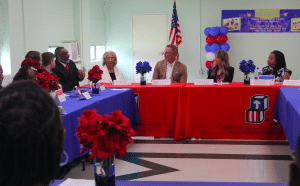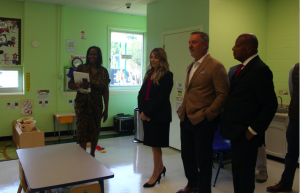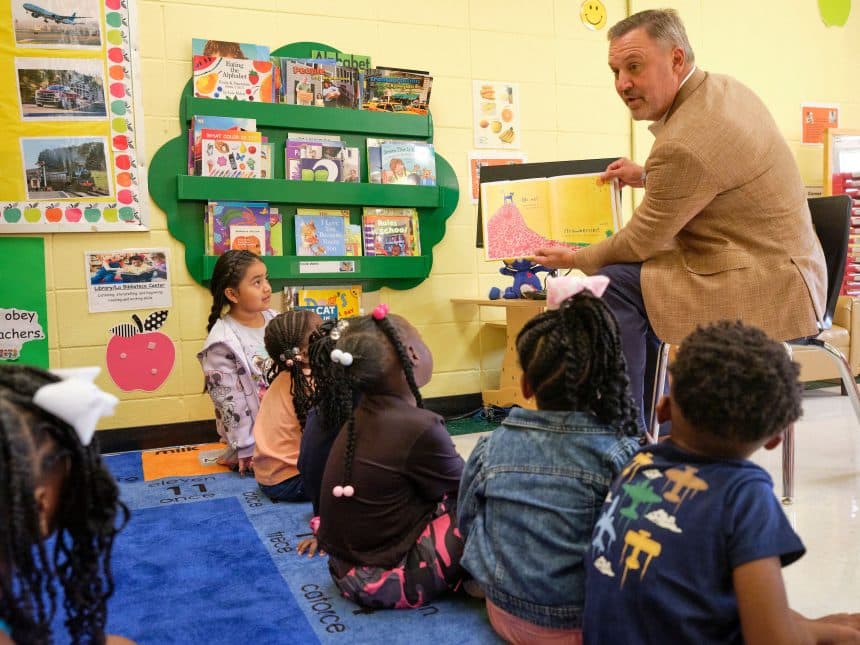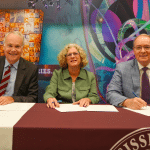Pick a classroom at the A.B. Devine, C.O. Chinn, W.E. Garrett Head Start/Early Head Start Center in Canton — any classroom — and you will find young children developing skills designed to help them excel educationally, and even socially.
Pupils in the STEAM (science, technology, engineering, arts, and mathematics) room can be spotted painting pieces that will without doubt be placed on a home refrigerator, while others explore puppetry and put their imaginations to work. In the computer lab, the children log onto a platform where they learn how to spell and solve math equations, among other functions, by way of creative games tailored to stimulate the mind and maximize attentiveness.
The children in these settings, according to Dr. Laurie Todd-Smith, an official within President Donald Trump’s administration, and Mississippi House Speaker Jason White, will be more prepared for kindergarten and the following grades than their peers who neither attended a Head Start center nor had the luxury of being brought up in an esteemed daycare setting.
“To come back in the role of leading Head Start and childcare feels a bit surreal, but also feels like I’m in the perfect point in time, and I really understand the needs of Head Start and childcare in Mississippi,” Todd-Smith told SuperTalk Mississippi News.

For those unfamiliar with Head Start, it is a federal program aimed at providing free child development and family support services for low-income children and families, from birth to age 5. Head Start was established in 1965 by former President Lyndon B. Johnson as part of his “War on Poverty” initiative. 60 years later, the program services 750,000 children nationwide but may be having its greatest impact in Mississippi.
Todd-Smith, the Deputy Assistant Secretary for Early Childhood Development at the Administration for Children and Families, a branch of the U.S. Department of Health and Human Services, acknowledged such when she paid a visit to her home state on Wednesday. While speaking with a coalition of parents, healthcare leaders, and Head Start operatives, Todd-Smith attributed the program as a contributing factor to the “Mississippi Miracle,” relating to recent education gains the state has achieved.
But with the successes come challenges, especially in a state like Mississippi where poverty rates are among the worst in the nation. During a roundtable discussion, Todd-Smith opened the floor to anyone who would be willing to expound upon the obstacles preventing Head Start centers from achieving further success and maximizing their reach in the state.
While the unanimous consensus among those who participated in the forum, several of whom attended a Head Start center as a child, was that the program has been a resounding bright light in Mississippi, a few major obstacles still exist in the pursuit to provide opportunities for Mississippi’s most vulnerable families. Among these roadblocks are funding concerns, credentialing regulations, re-verification processes, and coverage gaps.
“The bottom line for the struggles is the funding,” Agape Educational Center President Margaret Chapman asserted during the discussion.
Mississippi currently has just north of 200 Head Start centers, which serve more than 22,000 children. These facilities are primarily funded by the federal government through grants. Collectively, the Head Start centers in the state received a little over $251 million out of the more than $12 billion pie in fiscal year 2023. The funding, though large for a state with under 3 million residents, is insufficient to meet the growing needs of Head Start operatives in Mississippi.
Rev. Charles Bell, who chairs the Friends of Children of Mississippi board of directors, told Todd-Smith that teacher retention has been a struggle. Friends of Children of Mississippi is the state’s largest Head Start services provider and has 20 locations. According to Bell, two specific factors have dwindled the pool of educators seeking a job at a Head Start facility: annual pay and the credentials required to teach.
To be a lead teacher at a Head Start center, one must possess a bachelor’s degree in child development or early childhood education. As for the salary that comes with the job, Bell insisted that better opportunities exist for educators looking to teach in public schools. Both of these factors limit the prospective candidate pool, though an educator shortage plagues the Head Start world like it does the rest of academia.
On top of a request for additional funding, Bell suggested that altering the qualification requirements to certify an educator to work in a Head Start center could pay dividends. He contended that there are qualified individuals capable of educating pupils in a Head Start facility who lack the credentials currently mandated by the federal government.
“Please promise that you will continue to fight for Head Start,” Bell pleaded to Todd-Smith.
Other speakers encouraged Todd-Smith to assess the process by which children are added to the Head Start system, then re-verified. One of the recommended reforms was to have students enrolled in the Early Head Start system automatically enrolled in the Head Start system to eliminate redundant paperwork. Early Head Start programs serve youth between 6 months and 3 years of age, while Head Start serves children between 3 and 5 years of age.
Another recommendation was for the federal government to explore opportunities to make public schools in Mississippi Head Start-compliant, while also promoting school-based clinics to meet the healthcare needs of children whose parents may lack insurance or Medicaid services.
After lending an attentive ear to every speaker’s commentary, Todd-Smith assured that she is dedicated to cutting the red tape that has held Head Start initiatives back from reaching their full potential. Highlighting that the original Head Start regulation guide was around 11 pages long and now consists of over 250 pages of rules, the federal administrator made it abundantly clear that deregulation is on her agenda. The notion was met with nods of affirmation and sighs of relief among almost all in the room.
“When we say deregulate, it doesn’t mean that we’re lessening the safety requirements for children, that we’re making it so that anybody can be a teacher. None of that is true,” Todd-Smith said. “It’s really focused on things that are making it cumbersome to do what’s best for children. And what’s best for young children is to have lots of play time. It’s to have interaction with adults who have been trained in how to talk to children. It’s to be provided with healthy meals, parenting classes, and all the things a Head Start does.”
Todd-Smith, a former public and preschool teacher, concluded the hour-long roundtable chat with a renewed mindset that she is in a perfect position to play a key role in making meaningful change in Mississippi, a place she knows as home. Her vision entails getting bureaucracy on the federal government’s end out of the way of progress and allowing individual states, like Mississippi, to spread their wings to better the lives of children.
“There are so many things that get in the way of us doing what we know is best for children. Those would be the regulations that I’m starting to look at in terms of where we could pull those back and make it a little more ‘child-friendly,'” Todd-Smith said.
“In Washington, D.C., Mississippi is the ‘gold star,'” she added, noting that people are constantly praising the state’s strides in reading and math scores. “I don’t have to do a lot of bragging — though I do a lot of bragging — but the results speak for themselves.”

At the state level, House Speaker White is on a campaign to expand “education freedom,” which would entail allowing more children to have access to early learning services, including Head Start. White also told Head Start providers in the room that they “have a friend in the speaker’s office.”
Looking to build upon the momentum Mississippi has garnered in education while fighting potential stagnation at the same time, White sees investments in early education as a game-changer, especially in the scenario that more parents are allowed to send their child to a Head Start center.
“In this choice space, after we start talking about real choice for K-5 through 12th grade in our state, we still think that K-4 could be a part of that through our early learning collaboratives and Head Start,” White said. “We’re willing to put more resources there, but we want parents in the community to be able to choose the Head Start if that’s what they want, and we think the early learning collaboratives are part of that connection.”
White, arguably Mississippi’s leading advocate of school choice, plans to continue working with allies in the federal government, like Todd-Smith, to focus on integrating subsidized early learning initiatives into a model that empowers parents and children. Notorious for his eagerness to take the “status quo” to task, White is especially optimistic that a working relationship between state officials and federal partners, with Todd-Smith as a liaison, will yield innovative ideas for the future of education.
Earlier this week, Todd-Smith spoke at the Mississippi House of Representatives’ first education freedom select committee meeting. White formed the new committee in June to explore school choice-related legislation before lawmakers return to the state capitol in January, though Gov. Tate Reeves has not ruled out a special session on the topic. Todd-Smith’s presence at the meeting further solidified that the state and federal governments are embarking upon a collaborative approach to early education.
“Now is not the time to stop and take a breather. We want to see what that next step is,” White said. “By having a Mississippian sitting in the role that Dr. Laurie Todd-Smith does in the Trump administration, there is a very unique opportunity for us. We’re willing to think outside the box, and she knows that. With our recent gains, she’s willing to shine a light on Mississippi for us, and allow us maybe to do some things outside the norm in ways we’ve shown are good for Mississippi.”
In the meantime, Todd-Smith continues to shine a light on what Mississippi has done educationally, especially to her colleagues in the nation’s capital, as she simultaneously works to address immediate challenges in early learning in her home state and abroad.








